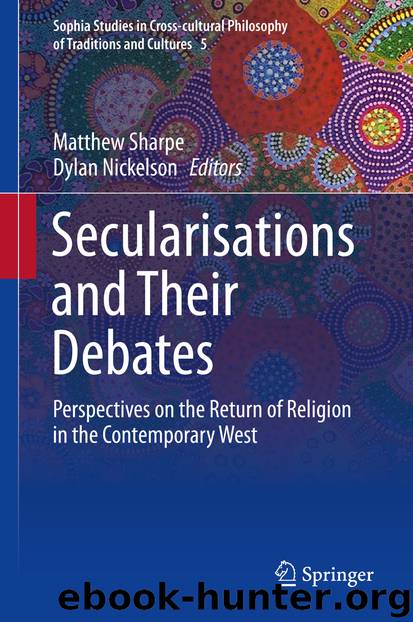Secularisations and Their Debates by Matthew Sharpe & Dylan Nickelson

Author:Matthew Sharpe & Dylan Nickelson
Language: eng
Format: epub
Publisher: Springer Netherlands, Dordrecht
Milbank elsewhere, with less obscurantism, bites the relativistic bullet. Alasdair MacIntyre ’s attempt to refound a species of neoclassical virtue, Milbank notes, is tempered by his awareness that different forms of virtue are praised in different societies, and that there are a plurality of different ethical worldviews (TST: 337–339). This could imply the relativistic claim that these worldviews are incommensurable and unable to communicate, as several sophists already asserted in classical Greece (TST: 337). MacIntyre, however, for his part withdraws from this possibility. He insists, in classically philosophical fashion, that disputes between competing perspectives should be resolvable by ‘…the dialectical testing of an assertion through comparison with a present, stable, and therefore non-narratable reality’ (TST: 344). And tellingly, it is for exactly this minimally realist assertion that Milbank rebukes MacIntyre, rejecting along the way Donald Davidson’s well-known denial of the very coherence of any assertion of radical incommensurability (TST: 340–343). It is simply impossible to adjudicate the claim that one viewpoint ‘explains more’ of reality than any other, Milbank claims (TST: 346). Considerations of meaning trump any search for a non-relativisable, extra-narratival truth: ‘There are only undecidable questions of truth because truth is relative to a ‘perspective’, or a particular preferred syntax or figuration for construing reality’ (TST: 343). We simply cannot assume, says Milbank, ‘that different cultural discourses are approximations to the same external (even if not independently specifiable) reality…’ (TST: 343).
How Milbank sees his denial here that human beings’ plural narratives can veridically access any universal law-like structures of external reality sitting alongside his attack on medieval nominalism as the arch-villain behind modernity seems a veritable mystery. Equally shrouded is the issue of what we can make of Milbank’s attempt to ‘deny that postmodern anti-realism is a threat to theological objectivism’ (TST: 296). What Milbank says is that his relativistic position opens a ‘fissure’ in postmodernism itself. It does this by allowing for the superimposition of a Christian, peaceable ontology on top of the postmodern critiques of modernity, in a gesture which would show that the (post)modern nihilists have opted, groundlessly, ‘for violence, … [in] preference for, or resignation to, an imagined cosmic terror’ (TST: 296). To want something to be true or possible, however, does not make it so. Milbank himself makes clear, contra MacIntyre who wants ‘to argue’ (Milbank’s italics) against modern liberalism, that ‘my case is rather that [liberalism] is only a mythos, and therefore cannot be refuted, but only out-narrated, if we can persuade people—for reasons of ‘literary taste’—that Christianity offers a much better story’ (TST: 330). Again, responding to today’s neoNietzscheans’ vision of primordial violence, Milbank comments that ‘to counter it, one cannot try to resuscitate liberal humanism, but one can try to put forward an alternative narrative, equally unfounded, but nonetheless embodying an “ontology of peace”…’ (TST: 279).
So the question here is: if per Milbank, Christianity’s narrative of primordial peace is ‘equally unfounded’ as what it opposes, by what criteria or authority are we to choose it over its polemical others? Why
Download
This site does not store any files on its server. We only index and link to content provided by other sites. Please contact the content providers to delete copyright contents if any and email us, we'll remove relevant links or contents immediately.
| Anthropology | Archaeology |
| Philosophy | Politics & Government |
| Social Sciences | Sociology |
| Women's Studies |
Born to Run: by Christopher McDougall(7125)
The Leavers by Lisa Ko(6948)
iGen by Jean M. Twenge(5414)
Sapiens by Yuval Noah Harari(5369)
Spare by Prince Harry The Duke of Sussex(5194)
The Kite Runner by Khaled Hosseini(5177)
Machine Learning at Scale with H2O by Gregory Keys | David Whiting(4312)
Bullshit Jobs by David Graeber(4190)
Never by Ken Follett(3954)
Goodbye Paradise(3809)
Livewired by David Eagleman(3772)
Fairy Tale by Stephen King(3393)
A Dictionary of Sociology by Unknown(3085)
Harry Potter 4 - Harry Potter and The Goblet of Fire by J.K.Rowling(3073)
The Social Psychology of Inequality by Unknown(3029)
The Club by A.L. Brooks(2925)
Will by Will Smith(2919)
0041152001443424520 .pdf by Unknown(2845)
People of the Earth: An Introduction to World Prehistory by Dr. Brian Fagan & Nadia Durrani(2736)
